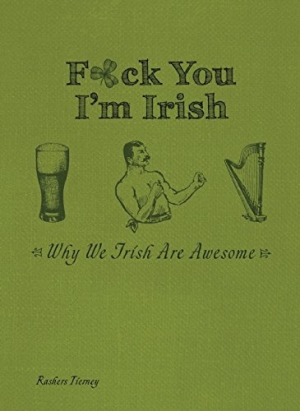F*ck You I'm Irish
Why We Irish Are Awesome
Those interested in Ireland and its history and people will find interesting reading here, sometimes humorous, sometimes serious, always informative.
Any prospective traveler to Ireland—or someone intent on winning a St. Patrick’s Day pub trivia contest—should find a copy of F*ck You, I’m Irish, Rashers Tierney’s short, fact-packed overview of Irish history and culture.
Tierney’s all-things-Eire chapters include “Sexy and Romantic Sons of Bitches,” “Irish Bad-Asses,” and “From Guinness to Whisk-e-y” plus more serious chapters like “Ireland’s Legacy of Learning and Knowledge.” That chapter’s a good lead-in to 1996’s nonfiction best seller How the Irish Saved Civilization. Irish monasteries, in fact, preserved immense amounts of knowledge from Dark Ages depredations.
Some factoids can be challenged, such as the one following the potato’s 1580 introduction, “The typical Irish peasant ate about 10 pounds of potatoes each day.” Another minor quibble: there’s an entry, “Feck—the Friendly F-Bomb,” highlighting Eire’s contribution to euphemisms. Why not use “feck” in the title?
Tierney’s work is well-organized, readable, and conversational, with few other noticeable errors. He’s done a yeoman’s job in researching connections between historical Irish elements and everyday popular references. For example, he discusses Margaret Mitchell’s Scarlett O’Hara and Gone with the Wind’s Irish element; he delves into origins of the “lace curtain” Irish; and he has good fun with tidbits like the “gentleman who pays the rent” as an euphemism for a pig kept to provide sustenance and to bring in a little extra money.
Tierney doesn’t shy away from hard facts. More than one million Irish souls perished during the potato famine. Strikingly, Ireland was then exporting other foodstuffs, and English overlords minimized or ignored the tragedy. The Great Famine became a catalyst for migration. Over one million left Eire. Human nature being what it is, the Irish traveling to America were “largely poor, unconnected, uneducated, and discriminated against.” The book, sadly, contains only generalized information about the origins of English oppression without noting exactly how the English came to cross the Irish Sea and dominate the land of Celts.
Tierney promises to deliver “astonishing historical accounts. Profiles of Irish heroes. Stories of struggles and success. Language. Music. Culture,” and does so entertainingly while incorporating interesting material not commonly known. An example is “the Brehon law,” an ancient Irish legal code supplanted by English law. Surprisingly, the Brehon law forbade capital punishment and assured equal rights for women.
Those interested in Ireland and its history and people will find interesting reading here, sometimes humorous, sometimes serious, and always informative.
Reviewed by
Gary Presley
Disclosure: This article is not an endorsement, but a review. The publisher of this book provided free copies of the book and paid a small fee to have their book reviewed by a professional reviewer. Foreword Reviews and Clarion Reviews make no guarantee that the publisher will receive a positive review. Foreword Magazine, Inc. is disclosing this in accordance with the Federal Trade Commission’s 16 CFR, Part 255.

